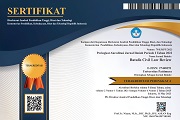The Phenomena of Kabalutan In The Highlights of Islamic Marriage Law
 ), Nursiah Moh Yunus(3), Ashar Ridwan(4), Ilham Nurman(5)
), Nursiah Moh Yunus(3), Ashar Ridwan(4), Ilham Nurman(5)
(1) Faculty of Law Tadulako University, Palu, Indonesia
(2) Faculty of Law Tadulako University, Palu, Indonesia
(3) Faculty of Law Tadulako University, Palu, Indonesia
(4) Faculty of Law Tadulako University, Palu, Indonesia
(5) Faculty of Law Tadulako University, Palu, Indonesia
 Corresponding Author
Corresponding Author
Abstract
Introduction: The ease of carrying out marriages and divorces in Kabalutan Village, Talatako District, Tojo Una Una Regency. One of the local residents was reported by the mass media that for marriage or divorce it is enough to bring it to the Penghulu. Whereas the real task of the Penghulu is to provide supervision and registration of marriages. Can get married if the bride does not have a Guardian.
Purposes of the Research: It is important to know and analyze how the implementation of marriage in Kabalutan Village is viewed from the perspective of Islamic law.
Methods of the Research: The method used is an empirical legal research method with primary data sources from religious leaders, community leaders, and the community in the village.
Results of the Research: So that the validity of a marriage is realized and in accordance with the objectives of the Marriage Law and also the Compilation of Islamic Law which states that marriage is a marriage, namely a very strong contract or mitsaqan ghalizhan to obey Allah's commands and carry them out is worship. The people of Kabalutan Village generally have unregistered marriages or marriages that are not registered due to the long distance and the cost of accommodation which is quite expensive to report and register their marriages to the relevant agencies.Keywords
DOI
10.47268/ballrev.v4i2.1752
Published
2023-12-02
How To Cite
@article{BALLREV1752,
author = {Nurhayati Nokoe and Susi Susilawati and Nursiah Yunus and Ashar Ridwan and Ilham Nurman},
title = {The Phenomena of Kabalutan In The Highlights of Islamic Marriage Law},
journal = {Batulis Civil Law Review},
volume = {4},
number = {2},
year = {2023},
keywords = {Marriage; Kabalutan; Islamic Law.},
abstract = {Introduction: The ease of carrying out marriages and divorces in Kabalutan Village, Talatako District, Tojo Una Una Regency. One of the local residents was reported by the mass media that for marriage or divorce it is enough to bring it to the Penghulu. Whereas the real task of the Penghulu is to provide supervision and registration of marriages. Can get married if the bride does not have a Guardian.Purposes of the Research: It is important to know and analyze how the implementation of marriage in Kabalutan Village is viewed from the perspective of Islamic law.Methods of the Research: The method used is an empirical legal research method with primary data sources from religious leaders, community leaders, and the community in the village.Results of the Research: So that the validity of a marriage is realized and in accordance with the objectives of the Marriage Law and also the Compilation of Islamic Law which states that marriage is a marriage, namely a very strong contract or mitsaqan ghalizhan to obey Allah's commands and carry them out is worship. The people of Kabalutan Village generally have unregistered marriages or marriages that are not registered due to the long distance and the cost of accommodation which is quite expensive to report and register their marriages to the relevant agencies.},
issn = {2746-8151}, pages = {183--197} doi = {10.47268/ballrev.v4i2.1752},
url = {https://fhukum.unpatti.ac.id/jurnal/ballrev/article/view/1752}
}
Journal Article
Bastomi, Hasan. Pernikahan Dini dan Dampaknya (Tinjauan Batas Umur Perkawinan Menurut Hukum Islam dan Hukum Perkawinan di Indonesia), Jurnal Yudisia, Vol. 7, no.2, Desember 2016.
Book
Abidin, Slamet dan Aminuddin. Fiqh Munakahat, Bandung: Pustaka Setia, 1999.
Ghozali, Abdul Rahman. Fiqh Munakahat, Jakarta: Kencana, 2003.
Hadikusuma, Hilman. Hukum Perkawinan Indonesia menurut:Perundangan, Hukum Adat, dan Hukum Agama. Print. III, CV. Bandung: Mandar Maju, 2007.
Jahar, Jamhari Makruf dan Asep Saefudin. Hukum Keluarga, Pidana dan Bisnis Kajian Perundang-undangan Indonesia, Fikih dan Hukum Internasional, Jakarta: Kencana Prenadamadia, 2013.
Kadir, A. Perspektif Baru Hukum Perkawinan Islam Nikah, Talak, Rujuk. Semarang: Fatawa Publishing, 2020.
Mardani, Hukum Perkawinan Islam Di Dunia Islam Modern, Yogyakarta: Graha Ilmu, 2011.
Masykuroh, Yufi Wiyos Rini. BP4 Kepenghuluan, Bandar Lampung: Fakultas Syari’ah, 2014.
Sabiq, Sayyid. Fiqh Sunnah, Jakarta: Pena Pundi aksara, 2008.
Sugiono. Metode Penelitian Administrasi. Bandung: Alfabeta, 2008.
_______. Metode Penelitian Kualitatif. Bandung: Alfabeta, 2009.
Tim Penyusun Kamus. Pusat Pembinaan dan Pengembangan Bahasa, Pusat Pembinaan dan Pengembangan Bahasa, Kamus Besar Bahasa Indonesia, Third Edition, Printing IV, Jakarta: Balai Pustaka, 2007.
Thesis, Online/World Wide Web and Others
Ahmad, Imam Kusnin, ‘Kampung Janda: Boleh Dikawin, Dibawa Jangan’, CoWasJP, 2016 https://www.cowasjp.com/read/1685/20161016/050522/kampung-janda-boleh-dikawin-dibawa-jangan/
Ali, Fahmi, ‘Potret ``Kampung Janda`` Di Kepulauan Togean’, TEMPO.CO (Pulau Kabalutan, 2016) https://foto.tempo.co/read/43935/potret-kampung-janda-di-kepulauan-togean#foto-2
Millah, Asep Sihabul. “Peran Penghulu dalam Implementasi UU No. 1 Tahun 1974 Tentang Perkawinan”,http;//www.scribd.com, 2014.
Qurni, Waisul. “Sanksi Bagi Penghulu Ilegal dalam Undang-undang No. 22 Tahun 1946 Jo. Undang-undang No. 32 Tahun 1954”. Skripsi Progam Studi Hukum keluarga Islam Universitas Islam Negri Syarif Hidayatullah, Jakarta, 2014.
Susilawati, Susi, Ashar Ridwan, and Sitti Fatimah Madusila, ‘Criminal Liability Against Perpetrators Of Fraudulent Criminal Act By Hynosis Susi Susilawati 1 , Ashar Ridwan 2 , Sitti Fatimah Madusila 3’, 6.1 2021.| Dublin Core | PKP Metadata Items | Metadata for this Document | |
| 1. | Title | Title of document | The Phenomena of Kabalutan In The Highlights of Islamic Marriage Law |
| 2. | Creator | Author's name, affiliation, country | Nurhayati Sutan Nokoe; Faculty of Law Tadulako University, Palu; Indonesia |
| 2. | Creator | Author's name, affiliation, country | Susi Susilawati; Faculty of Law Tadulako University, Palu; Indonesia |
| 2. | Creator | Author's name, affiliation, country | Nursiah Moh Yunus; Faculty of Law Tadulako University, Palu; Indonesia |
| 2. | Creator | Author's name, affiliation, country | Ashar Ridwan; Faculty of Law Tadulako University, Palu; Indonesia |
| 2. | Creator | Author's name, affiliation, country | Ilham Nurman; Faculty of Law Tadulako University, Palu; Indonesia |
| 3. | Subject | Discipline(s) | |
| 3. | Subject | Keyword(s) | Marriage; Kabalutan; Islamic Law. |
| 4. | Description | Abstract | Introduction: The ease of carrying out marriages and divorces in Kabalutan Village, Talatako District, Tojo Una Una Regency. One of the local residents was reported by the mass media that for marriage or divorce it is enough to bring it to the Penghulu. Whereas the real task of the Penghulu is to provide supervision and registration of marriages. Can get married if the bride does not have a Guardian.Purposes of the Research: It is important to know and analyze how the implementation of marriage in Kabalutan Village is viewed from the perspective of Islamic law.Methods of the Research: The method used is an empirical legal research method with primary data sources from religious leaders, community leaders, and the community in the village.Results of the Research: So that the validity of a marriage is realized and in accordance with the objectives of the Marriage Law and also the Compilation of Islamic Law which states that marriage is a marriage, namely a very strong contract or mitsaqan ghalizhan to obey Allah's commands and carry them out is worship. The people of Kabalutan Village generally have unregistered marriages or marriages that are not registered due to the long distance and the cost of accommodation which is quite expensive to report and register their marriages to the relevant agencies. |
| 5. | Publisher | Organizing agency, location | Faculty of Law, Universitas Pattimura |
| 6. | Contributor | Sponsor(s) | |
| 7. | Date | (YYYY-MM-DD) | 2023-12-02 |
| 8. | Type | Status & genre | Peer-reviewed Article |
| 8. | Type | Type | |
| 9. | Format | File format | |
| 10. | Identifier | Uniform Resource Identifier | https://fhukum.unpatti.ac.id/jurnal/ballrev/article/view/1752 |
| 10. | Identifier | Digital Object Identifier | 10.47268/ballrev.v4i2.1752 |
| 11. | Source | Title; vol., no. (year) | Batulis Civil Law Review; Vol 4, No 2 (2023): VOLUME 4 ISSUE 2, NOVEMBER 2023 |
| 12. | Language | English=en | en |
| 13. | Relation | Supp. Files |
Untitled (953KB) |
| 14. | Coverage | Geo-spatial location, chronological period, research sample (gender, age, etc.) | |
| 15. | Rights | Copyright and permissions | Copyright: Authors who publish their manuscripts in this Journal agree to the following conditions: 1. The copyright in each article belongs to the author, as well as the right to patent. 2. Authors are able to enter into separate, additional contractual arrangements for the non-exclusive distribution of the journal's published version of the work (e.g., post it to an institutional repository or publish it in a book), with an acknowledgment of its initial publication in this journal. 3. Authors are permitted and encouraged to post their work online (e.g., in institutional repositories or on their website) prior to and during the submission process, as it can lead to productive exchanges, as well as earlier and greater citation of published work. 4. Authors have the right to self-archiving of the article (Author Self-Archiving Policy)
Licence : Batulis Civil Law Review Journal is disseminated based on the Creative Commons Attribution-NonCommercial 4.0 International license terms. This license allows anyone to copy and redistribute this material in any form or format, compose, modify, and make derivatives of this material for any purpose. You cannot use this material for commercial purposes. You must specify an appropriate name, include a link to the license, and certify that any changes have been made. You can do this in a way that is appropriate, but does not imply that the licensor supports you or your use.
|
Copyright (c) 2023 Nurhayati Sutan Nokoe, Susi Susilawati, Nursiah Moh. Yunus, Ashar Ridwan, Ilham Nurman

This work is licensed under a Creative Commons Attribution-NonCommercial 4.0 International License.

 : 1682 times
: 1682 times Download : 1001 times
Download : 1001 times














